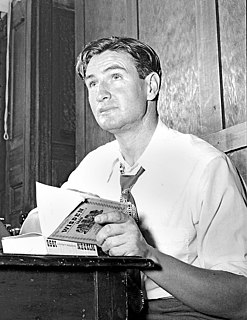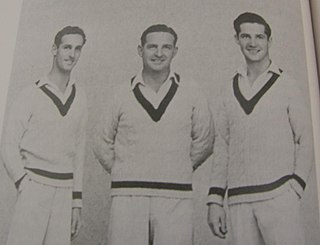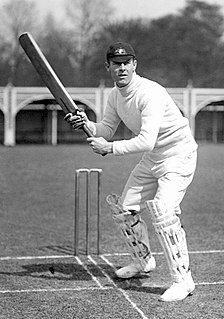Related Research Articles

Keith Ross Miller, was an Australian Test cricketer and a Royal Australian Air Force pilot during World War II. Miller is widely regarded as Australia's greatest ever all-rounder. His ability, irreverent manner and good looks made him a crowd favourite. English journalist Ian Wooldridge called Miller "the golden boy" of cricket, leading to his being nicknamed "Nugget". He "was more than a cricketer ... he embodied the idea that there was more to life than cricket".

The Australian cricket team in England in 1948 is famous for being the only Test match side to play an entire tour of England without losing a match. This feat earned them the nickname of "The Invincibles", and they are regarded as one of the greatest cricket teams of all time. According to the Australian federal government the team "is one of Australia's most cherished sporting legends". The team was captained by Don Bradman, who was making his fourth and final tour of England.

Ian William Geddes Johnson, was an Australian cricketer who played 45 Test matches as a slow off-break bowler between 1946 and 1956. Johnson captured 109 Test wickets at an average of 29.19 runs per wicket and as a capable lower order batsman made 1,000 runs at an average of 18.51 runs per dismissal. He captained the Australian team in 17 Tests, winning seven and losing five, with a further five drawn. Despite this record, he is better known as the captain who lost consecutive Ashes series against England. Urbane, well-spoken and popular with his opponents and the public, he was seen by his teammates as a disciplinarian and his natural optimism was often seen as naive.
Colin Reid Miller is an Australian former cricketer who played 18 Tests for Australia between 1998 and 2001. In May 2002, Miller announced his retirement from cricket.

Walter Frank Giffen was an Australian sportsman who played in three Test cricket matches between 1887 and 1892 and played in Australian rules football for Norwood Football Club in the South Australian Football Association.
Clarence Edgar "Mick" Harvey was a first-class cricketer and Australian Test cricket umpire. He was the brother of Test batsmen Merv and Neil Harvey. He was born in Newcastle, New South Wales and died in Brisbane, Queensland.

The Harvey brothers are six siblings from Victoria, Australia, known primarily for their success in the sport of cricket between the mid-1930s and the early 1960s. The sons of Horace and Elsie Harvey, in chronological order, they are Merv (1918–1995), Clarence, Harold, Ray, Neil and Brian (1932–1969). All six were long-serving members of the Fitzroy Cricket Club, which played in Melbourne's district cricket competition.

The Australian cricket team toured England in the 1953 season to play a five-match Test series against England for The Ashes.
Len Hutton captained the English cricket team in Australia in 1954–55, playing as England against Australia in the 1954–55 Ashes series and as the MCC in other matches on the tour. It was the first time that an England team had toured Australia under a professional captain since the 1880s. After losing the First Test by an innings, they beat Australia 3–1 and retained the Ashes. The combination of Frank Tyson, Brian Statham, Trevor Bailey, Johnny Wardle and Bob Appleyard made it one of the strongest bowling sides to tour Australia, and it was the only team of any nationality to defeat Australia at home between 1932–33 and 1970–71.
The Australian cricket team toured England in the 1977 season to play five Test matches for the 1977 Ashes series against England. The Australians also played three one day internationals and 19 other tour matches.
Michael Potter is an Australian professional rugby league football coach and former player. He was previously head coach of Super League clubs, the Catalans Dragons, St Helens, the Bradford Bulls and National Rugby League club the Wests Tigers. As a player, he was a New South Wales State of Origin representative fullback, playing his club football for the Canterbury-Bankstown Bulldogs, the St George Dragons and the Western Reds.
The Australian Services XI was a cricket team comprising solely military service personnel during World War II. They became active in May 1945 after the defeat of Nazi Germany. The team played matches against English cricket sides of both military and civilian origins to celebrate the end of the war. These matches were aimed at increasing morale in the war-ravaged English cities and as a means of reviving cricket after the conclusion of fighting.

This article chronicles the life of Keith Miller, an Australian Test cricketer and Australian rules footballer, from his birth on 28 November 1919 until 20 August 1940, when he left civilian life and joined the Militia during World War II. Born in the town of Sunshine on the outskirts of Melbourne, Miller made sport the focal point of his early life. The youngest of four children of Scottish descent, Miller joined his siblings in being inculcated with a love of sport by their father, playing football in winter and cricket in summer. Miller's father—an engineer and sportslover—emphasised the importance of technique over power; Miller benefited as he was of small stature during his childhood and could not rely on brute strength. Miller yearned to be a horse racing jockey, as he felt that he would not have the physique to succeed in cricket or football.
The military career of Keith Miller, an Australian Test cricketer and Australian rules footballer, lasted from August 1940 until June 1946, when World War II interrupted his sporting career. Miller enlisted in the Militia, before switching to the Royal Australian Air Force (RAAF), where he served from November 1941 until 1946 when he was discharged with the rank of flying officer. Miller trained as a fighter pilot, and in the last month of the European theatre of war, he flew combat missions over German installations. However, Miller was more notable for his efforts as a cricketer, representing the Royal Australian Air Force cricket team and after VE Day, the Australian Services in the Victory Tests of 1945, followed by a tour of the Indian subcontinent and Australia before being demobilised.

Keith Miller was a member of Donald Bradman's famous Australian cricket team, which toured England in 1948 and went undefeated in its 34 matches. This unprecedented feat by a Test side touring England earned the Australians the sobriquet "The Invincibles". Miller was an all-rounder: a right-arm opening fast bowler and a right-handed middle-order batsman. With Ray Lindwall, he formed Australia's first-choice opening attack, a combination regarded as one of the best of all time. Miller was also a skillful slip fielder, regarded by his captain as the best in the world.

During the 1946–47 Australian cricket season, all rounder Keith Miller represented Victoria and Australia. A 27-year-old right-handed batsman and fast bowler, Miller played in all five Tests against England, performing well with both bat and ball. He finished top of the Australian Test bowling averages, taking 16 wickets at 20.88, and was second in the batting averages, scoring 384 runs at 76.80. On his Ashes debut in the First Test in Brisbane, Miller scored 79 before taking match bowling figures of 9 wickets for 77 runs (9/77) in Australia's innings victory. In the Fourth Test, played at the Adelaide Oval, Miller broke through for his first Test century, scoring an unbeaten 141. A middle-order batsman and right-arm opening bowler, Miller finished the Test series as Australia's joint leading wicket-taker, along with his new ball partner Ray Lindwall, as Australia won the series 3–0.
Couldn't Be Fairer is a 1984 Australian documentary film directed by Dennis O'Rourke and narrated by Aboriginal activist Mick Miller, which paints a disturbing portrait of Indigenous life in Australia's Deep South, the northern state of Queensland. The title of the film references a 1983 statement about Aboriginal Australians made by Joh Bjelke-Petersen, the Premier of Queensland at the time: "We treat them the same as everyone else – couldn't be fairer."

Victor Thomas Trumper was an Australian cricketer known as the most stylish and versatile batsman of the Golden Age of cricket, capable of playing match-winning innings on wet wickets his contemporaries found unplayable. Archie MacLaren said of him, "Compared to Victor I was a cab-horse to a Derby winner". Trumper was also a key figure in the foundation of rugby league in Australia.
Michael Douglas Martell is an Australian cricket umpire.

Vincent Norman "Mick" Raymer was a cricketer who played first-class cricket for Queensland from 1940 to 1956.
References
- ↑ "Mick Miller". ESPN Cricinfo. Retrieved 3 April 2016.